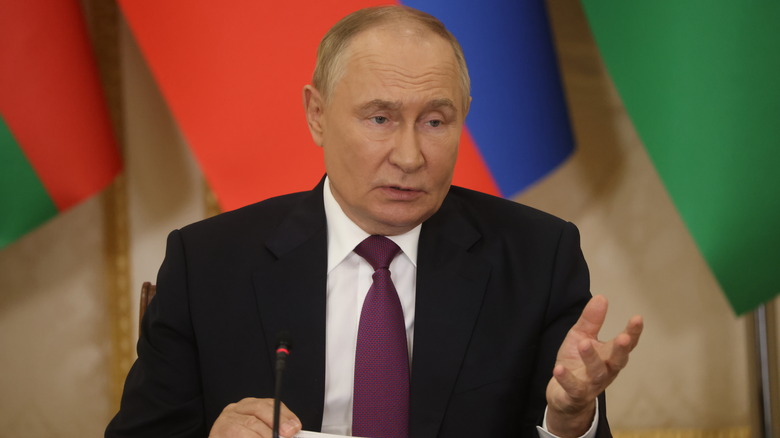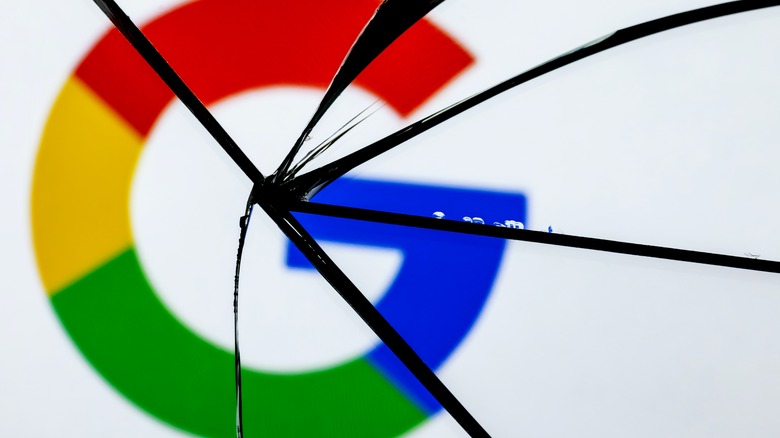Everything We Know About Vladimir Putin Seizing Millions Of Dollars From Google
Google has long had a difficult relationship with the theory and practice of dictatorship. They've been credibly accused of being such within the tech world; its sheer size and its business practices make it hard to argue otherwise. The company was branded an illegal monopoly in August 2024 in a watershed case before a U.S. federal court. But Google has also struggled to navigate its relationship with dictatorial governments. It received — and honored — thousands of requests for censorship by regimes from around the world, and its compliance with dictates by the Chinese government in the early 2000s brought it condemnation by international rights groups (the country later reversed course, though not consistently).
In the 2020s, Google has run into difficulties with the dictatorship in Russia. When hostilities in the Russo-Ukrainian War resumed in 2022, Russia demanded that Google censor any ads that it branded as misleading or false about its invasion within its territory on its subsidiary, YouTube. In response, Google temporarily suspended all its advertising in Russia. The following year, Russia imposed a fine on the company for not removing material sympathetic toward Ukraine; an appeal within the Russian court system failed the following April. Another fine, for not retaining personal user information, was levied in November 2023.
In the background of these legal battles, Vladimir Putin's regime inflicted greater damage on Google's Russia arm. It was widely reported in August 2024 that Russian authorities had taken over $100 million from the company's bank accounts within Russia two years prior, a move that forced Google Russia into bankruptcy.
Putin's regime kept hitting Google financially after invading Ukraine
Google's response to Russia following the 2022 Ukrainian invasion was complicated by their 100 employees working in Russia. According to The New York Times, Vladimir Putin's regime has gone after workers when their companies don't comply with government requests. In the immediate aftermath of its clash with Russian censorship demands, Google did not see its employees prosecuted. But it did see a series of financial hits after it expanded its response to the Ukraine invasion.
Following its temporary advertising freeze, Google opted to ban several high-profile, state-sponsored Russian channels from YouTube, first in Europe and then globally. It also suspended software updates, app purchases, and software updates, though basic free services remained. In retaliation, the Russian government imposed a series of fines, some related to Google's blocking of their media, some related to pro-Ukrainian content left on Google or YouTube in the country. They then seized the $100 million from Google's accounts, though the amount wouldn't be reported for two years. Unlike the fines, no reason was given for the asset seizure at the time.
Such a heavy financial blow was too much for Google Russia to sustain. It was forced to declare bankruptcy in May 2022. The motion and the seizure left Google Russia unable to pay its employees. Most of them were moved out of the country or else left the company while remaining in Russia, before bankruptcy had even been declared, per The Wall Street Journal.
Russia has put Google's money toward propaganda
The same court documents that revealed the amount of money Russia seized from Google in 2022 also provided the grounds given: the company owed damages to state-sponsored and regime-friendly TV stations. One of the fines imposed on Google prior to their account seizure was because Google blocked a channel controlled by Konstantin Malofeev, a notorious oligarch under U.S. sanctions since 2014 for his rhetoric against Ukraine. Malofeev's Tsargrad TV, an Orthodox Christian channel, was named in the Moscow court order allowing the account to be seized on top of the $12.5 million fine.
Malofeev wasn't the only media figure to benefit from the money taken from Google. Several channels received payouts, including RT. But Tsargrad's management vowed to specifically use the money they received from Google for propaganda purposes; it was put toward content supportive of Russia's invasion and its ongoing war with Ukraine. Former employees and creditors of Google had to wait in line behind broadcasters.
According to The Telegraph, Russia maintains that Tsargrad is owed still more; they put Google's penalty at £273 million ($360 million). It has followed up its seizure of Russian assets with efforts to get at Google's accounts in other countries. In response, Google filed its own lawsuits in August 2024 in British and American courts against Tarsgrad, RT, and NFPT in an effort to thwart further seizures.


